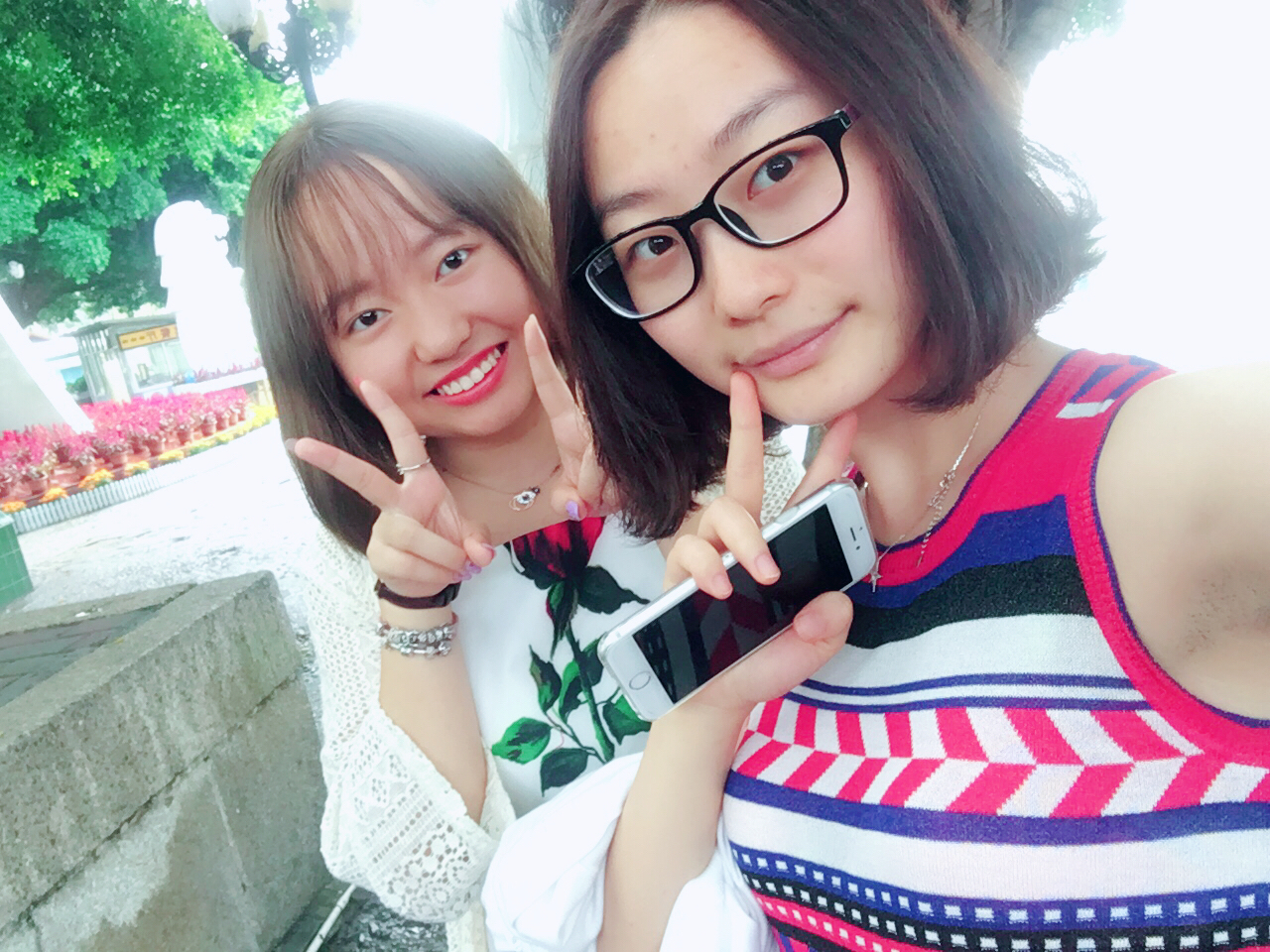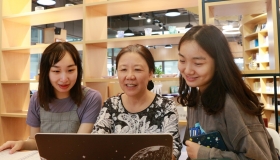Two student entrepreneurs donated RMB one million to CUHK-Shenzhen
With the success of their startup project, Li Zhixuan and Yan Danyang donated RMB one million to CUHK-Shenzhen, becoming the first batch bachelor degree graduates who has made donation to the alma mater.

Li Zhixuan (Marketing, Class of 2018, SME) is the founder of Leadygo, a student service platform for campuses. She used to be the Vice Director of Public Relations Department of the first Student Union of the Chinese University of Hong Kong, Shenzhen and served as the leader of the Mandarin Debate Team. She has participated in the first National University Student Financial Challenge Competition and won the national third place and has received the Outstanding Leadership Student Award.
Yan Danyang (Class of 2018, Applied Economics, SME) is the co-founder Leadygo and is the chairman of Tianle Culture Communication (Shenzhen) Co., Ltd. Her start-up project Siqi Education won the investment of Galaxy World and was rated as an outstanding innovation project. She used to be the secretary of the Social Union Department of the First Student Union of the Chinese University of Hong Kong, Shenzhen.
Li and Yan made a profit through their entrepreneurial projects and donated RMB 1 million to the Chinese University of Hong Kong, Shenzhen, which made them the first batch of undergraduates who returned to their alma mater through donations.
This interview is to explore the story of college students' entrepreneurship through their sharing, and also to bring inspiration to the younger students.
Q: Can you briefly introduce your entrepreneurial project and what you have achieved so far?
A: We launched Leadygo, a campus service platform in our university, to provide help and convenience for students' learning and life, and to help students to promote some of their entrepreneurial projects. In the course of operating Leadygo, we have accumulated a lot of experience and also met some partners. In November 2016, we formally established our own cultural communication company to help individuals and small companies make marketing plans. The company became profitable after about half a year, and its scale is gradually expanding.
Q: What is the motivation for starting a business?
A: We planned to start a business very early. But originally, we planned to start our own business after years of working experience. However, we came up with relatively good ideas and started our business ahead of schedule, which allowed us to accumulate experience for the future.
Q: Did you get any support from the University at the early stage? And how can the University's education model help your business?
A: The University actually supports our entrepreneurial project a lot. When our project just began, the University's CIDE teacher talked with us for a long time and gave us many guidance suggestions. We have learned a lot form the entrepreneurial lectures held by CIDE, the “Industry Focus” lectures held by the SME, and the Bowen lectures. At the same time, the University has a Galaxy World Innovation Fund that provides financial support for some of our projects. The Student Affairs Office, the Administrative Department, and the Property Department also gave us a lot of help.
Our majors are Marketing and Applied Economics. The teaching model of the University has provided us with very great help. The University not only pays attention to the study of theoretical knowledge but also to practical exercises. Many courses feature case analysis and the teachers have taken us through all kinds of cases. We thus got connected to the real business community and can apply the knowledge we learnt in class to the real situation. In the freshman's English class, we received trainings in doing seminars and presentation. The trainings stressed on the dialectical treatment of problems. We were also required to wear formal clothing when we were doing presentations. Thus we accumulated more business-related practical experiences.
Q: In the process of entrepreneurship, what do you think are the biggest difficulties and how do you overcome them? Can you give some specific examples?
A: Actually, we encountered many problems. However, we overcome them through our perseverance.
1. Time allocation
We were already under great learning pressure. She (Lee) was the leader of the University's debate team and liked to participate in debate games and other business matches; while I (Yan) took exams such as ACCA in the second year, which made me very busy. Our business sometimes made us very tired, especially during midterms and finals. When we were stressed out, we often wandered around the campus to relieve ourselves.
We were already under great learning pressure. She (Lee) was the leader of the University's debate team and liked to participate in debate games and other business matches; while I (Yan) took exams such as ACCA in the second year, which made me very busy. Our business sometimes made us very tired, especially during midterms and finals. When we were stressed out, we often wandered around the campus to relieve ourselves.
2. Psychological stress and family pressure
The initial stage of starting a business is basically a stage of experience accumulation. Although many things had been done, most of them had no results. It even affected our academic performance at the beginning. When the academic pressure was very high, we even questioned ourselves: what is the point in spending so much time in entrepreneurship? Parents hope that we can find a stable job, so they did not support us at first. Especially when they knew that we stayed up late for the business, they tried to persuade us to give it up. But now, our parents are very much pleased with our choice and being supportive.
The initial stage of starting a business is basically a stage of experience accumulation. Although many things had been done, most of them had no results. It even affected our academic performance at the beginning. When the academic pressure was very high, we even questioned ourselves: what is the point in spending so much time in entrepreneurship? Parents hope that we can find a stable job, so they did not support us at first. Especially when they knew that we stayed up late for the business, they tried to persuade us to give it up. But now, our parents are very much pleased with our choice and being supportive.
3. Challenges encountered
In the early days of our business, we tried to contact a number of companies to help them with some planning activities. However, most companies questioned us being students. After accumulating some experiences at the university, such as helping students with their course selection, etc., we started to be recognized by some companies.
In the early days of our business, we tried to contact a number of companies to help them with some planning activities. However, most companies questioned us being students. After accumulating some experiences at the university, such as helping students with their course selection, etc., we started to be recognized by some companies.
Q: What do you think are the determinants of entrepreneurial success?
A: Teamwork, direction, and perseverance. Teamwork is the most important. Members of the team need to be in tune with each other so that they can communicate well and avoid unnecessary misunderstandings and disputes; then the team members should complement each other to ensure that the team's ability meets the requirements of the entrepreneurial project. It would be better if the direction in the area of interest, since entrepreneurship is really an arduous process. You may have fun while doing something you like. The last one is perseverance. As mentioned earlier, there are various problems in the process of starting a business. If there is no perseverance, it is absolutely impossible.
Q: What is your biggest feeling in the course of building your business?
A: Not everyone is suitable for starting a business. Whether to do it or not depends on your situation. During my two years of building my business, I have seen many partners quitting due to mentality problems or direction problems. Some of them are not clear about what to do next. Although we started with a trial-and-error approach, we put our business within our own plans, so we are willing to spend more time and energy to start a business.
Q: What is your next step? Will you continue doing start-ups after graduation?
A: Yes, we will. The development direction is mainly in education and human resources. We are making further preparations for these projects. We intend to pursue studies in social welfare policy and other master's programs related to pedagogy and psychology. We hope to create our own education brand and make certain achievements in the industry, and then do our best to bring better educational resources to poor areas.
Q: In terms of doing start-ups, what advice do you have for the juniors?
A:
1. You need to think clearly about what you really want before you start your own business. Do not think that you can take an internship in a big company and start a business at the same time. It may be a waste of time and energy. After finding your own direction, work hard towards that.
1. You need to think clearly about what you really want before you start your own business. Do not think that you can take an internship in a big company and start a business at the same time. It may be a waste of time and energy. After finding your own direction, work hard towards that.
2. Perseverance is necessary. I met some entrepreneurial partners from the Shenzhen Institute of Information Technology before. They had done "SIIT Information Service Station" and "Guoranai" match-making project, which were pretty good at the beginning. However, they did not continue after they graduated and started to work. Moreover, their subsequent work has few connection with their entrepreneurial experience. So some of them think it is a waste of time. Of course, I did see some people really focusing on their entrepreneurial work and made a success. The company Express Bonbon is a good example.
3. If you are looking for help, you can find some inspiration and entrepreneurial partners from your classmates and seniors. After all, communication between classmates is easier and convenient. The university is also supportive. For example, you can apply for the venture capital from Galaxy World or go to CIDE to consult for entrepreneurial suggestions. We also plan to donate funds to help CUHK-Shenzhen students start a business. If you have needs, our cultural communication company can provide you with suggestions and help you with the promotion.
Q: Are you familiar with the government's policies for entrepreneurial projects of university students? Are they useful for university students?
A: The current policy will have some advantages in terms of financing, opening, taxation, entrepreneurship training, and guidance, including discounting fees by half when opening an account at the bank. Preferential policies can still bring a lot of convenience to students who really want to start a business.
Q: We know that you have donated 1 million RMB to the university. What is the original intention of your donation? Do you have any ideas about the long-term mechanism for students to donate to his or her alma mater?
A:
1. The original intention was to show our gratitude to our alma mater for its training and teaching which made us who we are. We are more inclined to practice, more courageous, and more willing to try. The university gave us a good entrepreneurial environment. CIDE and the Galaxy World Fund all provided us with a lot of help. When there are problems, the teacher will promptly provide suggestions and share us some experience.
1. The original intention was to show our gratitude to our alma mater for its training and teaching which made us who we are. We are more inclined to practice, more courageous, and more willing to try. The university gave us a good entrepreneurial environment. CIDE and the Galaxy World Fund all provided us with a lot of help. When there are problems, the teacher will promptly provide suggestions and share us some experience.
2. We hope to motivate more students. After all, we are the first graduates. Maybe everyone will feel that the future is not so sure. We do not have senior brothers and sisters, and no one gives us some guidelines. No one knows what is waiting for us ahead. Our donation is to encourage everyone to believe that our future will be better.
3. I hope to encourage the development of innovation, trial-and-error, and practice of CUHK-Shenzhen students. If it is a good project, we will grant a scholarship. The students with the scholarship may be more likely to start their own business. This is also a network of mutual assistance. Our donation is a five-year donation. It would be a special gift to the University five years later at the tenth anniversary of the University at that time. It was hoped that more students would be able to contribute to their alma mater and organize a larger scholarship donation pool. The alumni culture and alumni network can be truly set up from the first graduates so that everyone can have a sense of belonging.
Q: Does the 100 million all come from your company's profit?
A: We plan to donate in five years and all of them will be from the company's profit. We are very confident about the future. At least the first year's donation will be all from the company's profit.
Interviewer: Li Yijie
Editor: Wu Qicheng
Editor: Wu Qicheng
More







